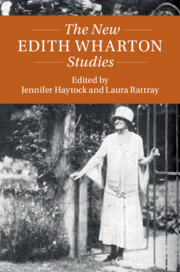Book contents
- The New Edith Wharton Studies
- Twenty-First-Century Critical Revisions
- The New Edith Wharton Studies
- Copyright page
- Contents
- Notes on Contributors
- Acknowledgments
- Editions and Abbreviations
- Introduction
- Part I Self and Composition
- Part II International Wharton
- Part III Wharton on the Margins
- Chapter 7 Edith Wharton’s Unprivileged Lives
- Chapter 8 Wharton, Insurance Culture, and Pain Management
- Chapter 9 Edith Wharton’s Humanimal Pity
- Chapter 10 Edith Wharton and the Writing of Whiteness
- Part IV Sex and Gender Revisited
- Bibliography
- Index
Chapter 9 - Edith Wharton’s Humanimal Pity
from Part III - Wharton on the Margins
Published online by Cambridge University Press: 28 November 2019
- The New Edith Wharton Studies
- Twenty-First-Century Critical Revisions
- The New Edith Wharton Studies
- Copyright page
- Contents
- Notes on Contributors
- Acknowledgments
- Editions and Abbreviations
- Introduction
- Part I Self and Composition
- Part II International Wharton
- Part III Wharton on the Margins
- Chapter 7 Edith Wharton’s Unprivileged Lives
- Chapter 8 Wharton, Insurance Culture, and Pain Management
- Chapter 9 Edith Wharton’s Humanimal Pity
- Chapter 10 Edith Wharton and the Writing of Whiteness
- Part IV Sex and Gender Revisited
- Bibliography
- Index
Summary
This essay analyzes the way that Edith Wharton’s writing frames the ethical and ontological relationship between human and nonhuman animals. Disputing a philosophical tradition that defines the difference between humans and animals on the basis of a capacity for language, Wharton – a committed animal lover – ambivalently suggests a less stark species boundary. The “humanimality” rendered in her work depicts human characters who are rendered animal through pain, through extreme experience, and through speechlessness. These representations are most manifest in Wharton’s wartime texts, Summer, Ethan Frome, and Fighting France. Wharton proposes that the appropriate posture toward both human and nonhuman animals is a pity based on the recognition of shared vulnerability to suffering. Yet her writing also frequently frames human–animal boundary-crossing as a mode of gothic excess, suggesting a pervasive anxiety about the very humanimaity that forms the basis of her compassionate ethics.
- Type
- Chapter
- Information
- The New Edith Wharton Studies , pp. 143 - 157Publisher: Cambridge University PressPrint publication year: 2019

